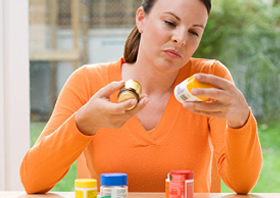James Chamberlain, M.D.
I am often asked questions about alcohol use, such as how much is safe and are there any health benefits. I tell my patients that drinking in moderation is fine. Alcohol is a part of our social fabric and there is nothing inherently bad about it. I tell my patients they don’t have to give up their glass of wine with dinner or a beer or two at a party, as long as they aren’t driving home. But I remind them that there are well-known downsides to excessive alcohol use and I urge caution for anyone who chooses to drink.
Clearly, the key is moderation. According to the Mayo Clinic, that is one drink a day for women of all ages and men older than age 65, and up to two drinks a day for men age 65 and younger.
Examples of one drink include:
- Beer: 12 fluid ounces
- Wine: 5 fluid ounces
- Distilled spirits (80 proof): 1.5 fluid ounces
Risks of Heavy Drinking
Heavy drinking is defined as more than three drinks on any day or more than seven drinks a week for women and for men older than age 65, and more than four drinks on any day or more than 14 drinks a week for men age 65 and younger. Binge drinking is four or more drinks within two hours for women and five or more drinks within two hours for men.
Heavy drinking can increase your risk of serious health problems, such as:
- Certain cancers, including breast cancer and cancers of the mouth, pharynx, larynx and esophagus
- Pancreatitis
- Sudden death if you already have cardiovascular disease
- Heart muscle damage (alcoholic cardiomyopathy) leading to heart failure
- Stroke
- High blood pressure
- Liver disease
- Brain damage and other problems in an unborn child
When to Avoid Alcohol
In certain situations, even moderate drinking may pose health risks. Ask your doctor whether you should avoid alcohol if:
- You’re pregnant or trying to become pregnant
- You have liver or pancreatic disease
- You have heart failure or you’ve been told you have a weak heart
- You take prescription or over-the-counter medications that can interact with alcohol
- You’ve had a hemorrhagic stroke (when a blood vessel in your brain leaks or ruptures)
- Any time you are going to get behind the wheel
- In combination with a variety of medications – always consult your doctor about the “drug interaction” potential of your medication with alcohol
Warning signs of problem drinking
- You feel guilty or ashamed about your drinking
- You lie to others or hide your drinking habits
- Your friends or family members are worried about your drinking
- You need to drink in order to relax or feel better
- You “black out” or forget what you did while you were drinking
- You regularly drink more than you intended to
- You have had problems in relationships, with work or with the law related to drinking
- You have had medical problems related to alcohol use
Are There Benefits?
Over the years, several studies have suggested possible benefits for moderate alcohol use, including:
- Reducing risk of developing and dying from heart disease
- Lowering risk of ischemic stroke (when the arteries to your brain become narrowed or blocked, causing severely reduced blood flow)
- Reducing risk of diabetes
- Slight reduction in overall mortality for moderate drinkers when compared to non-drinkers
The key again is moderation. Many people find it difficult to stay under one or two drinks a day. A glass of wine or a beer each evening followed by heavier drinking on weekend nights is too much. It’s the average consumption per day that matters. If you know you will be drinking on the weekends it’s best to avoid those weeknight drinks. And everyone should be aware of the signs of problem drinking and seek help if they find themselves unable to control their alcohol use.
Talk to your family doctor if you are concerned about your drinking. We can help you figure out if it’s a problem and get you the help you need if it is.
Additional resources:
http://www.mayoclinic.org/diseases-conditions/alcoholism/basics/symptoms/con-20020866
https://ncadd.org/learn-about-alcohol/signs-and-symptoms
 Dr. James Chamberlain is a Maryland Primary Care Physicians, LLC partner and is certified by the American Board of Family Medicine. He received his medical degree from University of Maryland School of Medicine in 1985 and completed his residency program in Family Practice at The Medical University of South Carolina in 1988. Dr. Chamberlain sees patients in the Queenstown office.
Dr. James Chamberlain is a Maryland Primary Care Physicians, LLC partner and is certified by the American Board of Family Medicine. He received his medical degree from University of Maryland School of Medicine in 1985 and completed his residency program in Family Practice at The Medical University of South Carolina in 1988. Dr. Chamberlain sees patients in the Queenstown office.







